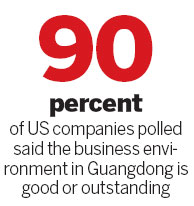|
 |
Members of the American Chamber of Commerce in South China expect their investment budgets to total more than $16.5 billion over the next three years, representing an increase of 40 percent on the previous three years.
Despite a sluggish global economy, member companies in the region expressed strong confidence in the market and in China's economic reforms, according to a survey published on Tuesday in Guangzhou, the capital of Guangdong province.
The poll asked 425 companies to predict their projected investment spending between 2013 and 2015. The chamber has more than 2,000 corporate and individual members in the southern Chinese region.
"Enterprises simply do not invest such vast amounts of money and effort in a business environment they deem to be uncompetitive or even particularly hazardous," said Harley Seyedin, president of AmCham South China.
"We estimate members hired in excess of 693,000 new employees over the course of 2012 and one very clear trend has been for participants to increasing their focus on the domestic market, rather than on exports."
The survey showed that in 2006, only 35 percent of companies were primarily focused on serving the Chinese mainland market with goods or services.
But 80.5 percent now consider it their top priority in 2013, compared with 70 percent last year.
"If companies are voting with their wallets, they are unequivocally throwing their support behind China - just as they have for the past several years," Seyedin added.
"In other words, I am pleased to report the state of business in South China remains excellent."
According to the survey, just under 90 percent of participants ranked the region's business environment as "good/acceptable", "very good" or "outstanding", while 47 percent felt it had improved over the past 12 months against 23 percent who felt it had worsened.
A resounding 95 percent of the participants reported either being profitable already or expecting to reach profitability within two years.
But the survey also showed that the list of participants' current major concerns, and over the next three years, is topped by "regulatory issues (Chinese government)", despite the local business environment being considered among the most appealing in China by many.
Other major concerns included local competition, rising labor costs, and a lack of skilled and general employees.
"This is the ninth consecutive year the survey has ever been conducted, making it easier for us to identify long-term trends," added Seyedin.
Zhu Xiaodan, when he was re-elected Guangdong governor last month, urged relevant departments and cities in the province to do what they could to improve levels of foreign investment.
Guo Yuanqiang, director-general of the Guangdong provincial department of foreign trade and economic cooperation, promised to improve the legal rights of foreign investors, and accelerate infrastructure improvements.
Guangdong, which borders Hong Kong and Macao special administrative regions, has been the country's biggest foreign trader for decades.
In January, Guangdong Customs said that the province's combined import and export volumes hit $95.16 billion, a year-on-year rise of 53.9 percent, and representing 27.5 percent of the country's total.
